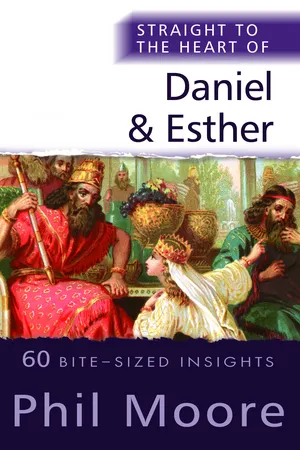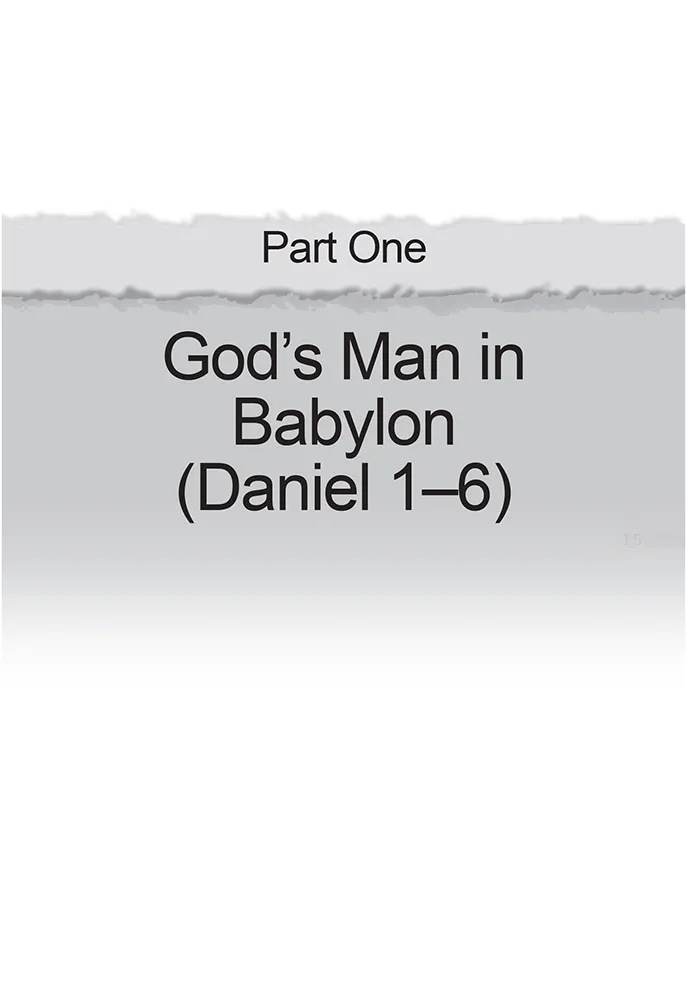
- 272 pages
- English
- ePUB (mobile friendly)
- Available on iOS & Android
About this book
When the Jews were carried off into exile in Babylon, most people assumed that it was the end of the story. In reality, God was just getting started. As senior figures in the Babylonian and Persian Empires, Daniel and Esther would discover that there is no foreign ground for God. Their faithful obedience would, in fact, lead their oppressive captors to faith in the God of Israel.
God inspired the Bible for a reason. He wants you read it and let it change your life. If you are willing to take this challenge seriously, then you will love Phil Moore’s devotional commentaries.
Their bite-sized chapters are punchy and relevant, yet crammed with fascinating scholarship. Welcome to a new way of reading the Bible. Welcome to the Straight to the Heart series.
Frequently asked questions
- Essential is ideal for learners and professionals who enjoy exploring a wide range of subjects. Access the Essential Library with 800,000+ trusted titles and best-sellers across business, personal growth, and the humanities. Includes unlimited reading time and Standard Read Aloud voice.
- Complete: Perfect for advanced learners and researchers needing full, unrestricted access. Unlock 1.4M+ books across hundreds of subjects, including academic and specialized titles. The Complete Plan also includes advanced features like Premium Read Aloud and Research Assistant.
Please note we cannot support devices running on iOS 13 and Android 7 or earlier. Learn more about using the app.
Information


Table of contents
- Cover
- Title
- Contents
- About the Straight to the Heart Series
- Introduction: It is God Who Put You Here
- PART ONE: GOD’S MAN IN BABYLON (Daniel 1–6)
- The End of the World (Daniel 1:1–5)
- How it All Begins (Daniel 1:3–8)
- Tightrope (Daniel 1:8–16)
- No Enemies? (Daniel 1:16)
- Drilling and Blasting (Daniel 1:17–21)
- On Their Backs (Daniel 2:1–13)
- Live Ready (Daniel 2:14–23)
- I Can’t, But God Can (Daniel 2:24–30)
- Everlasting Kingdom (Daniel 2:31–45)
- Little Seeds (Daniel 2:46–49)
- Chain Reaction (Daniel 3:1–12)
- Two Forms of Faith (Daniel 3:13–18)
- Cameo (Daniel 3:19–27)
- The Wrong Words (Daniel 4:1–9)
- Patience (Daniel 4:8–27)
- The Garden (Daniel 4:28–37)
- Unlikely Converts (Daniel 4:37)
- The End of the Road (Daniel 5:1–12)
- A Long Obedience (Daniel 5:13–29)
- Nevertheless (Daniel 5:30–5:31)
- Déjà Vu (Daniel 6:1–9)
- Secret Weapon (Daniel 6:10–11)
- Living God (Daniel 6:12–22)
- Beyond (Daniel 6:23–28)
- PART TWO: GOD’S PEOPLE IN THE WORLD (Daniel 7–12)
- Fantastic Beasts and Where to Find Them (Daniel 7:1–28)
- God Has a Son (Daniel 7:9–14)
- Apocalypse Now (Daniel 7:15–28)
- Manifest (Daniel 8:1–27)
- Weapon #1: The Main Thing (Daniel 8:26–27)
- Weapon #2: Scripture (Daniel 9:1–3)
- Weapon #3: Fasting (Daniel 9:3)
- Weapon #4: Prayer (Daniel 9:4–19)
- Faster than Angels Can Fly (Daniel 9:20–27)
- Weapon #5: Authority (Daniel 10:1 – 11:1)
- What Must Soon Take Place (Daniel 11:2–20)
- Twin Peaks (Daniel 11:21–45)
- Weapon #6: Knowing God (Daniel 11:32–35)
- Stars in the Night Sky (Daniel 12:1–13)
- PART THREE: GOD’S WOMAN IN PERSIA (Esther 1–10)
- Same Difference (Esther 1:1–8)
- The Queen’s Gambit (Esther 1:9–22)
- Later (Esther 2:1–11)
- Beauty Queen (Esther 2:12–18)
- Providence (Esther 2:19–23)
- Assassin’s Creed (Esther 3:1–15)
- The Answer is “No” (Esther 3:2–6)
- Weapons of Persia (Esther 4:1–17)
- Destiny (Esther 4:12–16)
- More Drilling and Blasting (Esther 5:1–8)
- Lasting Happiness (Esther 5:9–14)
- Mordecai’s Helper (Esther 6:1–14)
- What Do You Want? (Esther 7:1–4)
- The Greasy Pole (Esther 7:5 – 8:2)
- Good News (Esther 8:1–17)
- Good News Shoes (Esther 8:1–17)
- Case Study (8:16 – 9:19)
- Invisible God (Esther 8:17 – 9:3)
- Purim (Esther 9:17–32)
- Final Word (Esther 10:1–3)
- Conclusion: It is God Who Put You Here